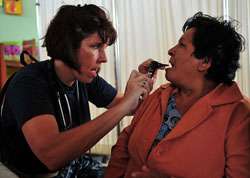New Jersey's adult minority, immigrant populations favor clinics as health care providers

(Medical Xpress) -- While almost 85 percent of New Jersey’s adults (ages 19 to 64) have a usual source of medical care (USC), the nearly 6 percent who utilize clinics are generally poorer and sicker than those who visit private doctors or group practices.
The Facts & Findings report, Differences Among New Jersey Adults Using Doctors, Clinics, and with no Usual Source of Care, prepared by Rutgers’ Center for State Health Policy (CSHP), found that adult minority and immigrant populations disproportionately turn either to clinics of some sort (hospital out-patient, walk-in center, community health center) or are without a USC, while doctors’ offices are serving more than their expected share of Non-Hispanic whites.
Moreover, nearly one-third of adults who use clinics as their usual source of care and more than half of those with no USC are uninsured or are covered though such public plans as Medicaid or NJ FamilyCare.
Data for the study comes from the center’s 2009 New Jersey Family Health Survey (NJFHS). The research highlights differences in the sociodemographic, health coverage and health status characteristics of the nonelderly adult population by their usual source of health care. The NJFHS, funded by the Robert Wood Johnson Foundation, provides population-based estimates of health care coverage, access, use and other topics important for New Jersey policy formulation and evaluation.
More than half (53 percent) of adults reside in a household where the survey respondent agrees that “having my medical needs taken care of at a public or free clinic is just fine with me,” write authors Kristen Lloyd and Dorothy Gaboda, CSHP research analyst and associate director for data analysis, respectively. However, willingness to use clinics is much stronger within certain subgroups, such as among the uninsured (76 percent) and among immigrants, especially recent noncitizen immigrants (94 percent).
Clinic visitors are about three times as likely to be either poor (below the federal poverty level) or near-poor (up to double the FPL) as those using doctors’ offices. When comparing rates of chronic conditions, acute symptoms and perceived general health status, the population using clinics reports more health problems overall than those who get care from a doctor’s office (61 percent to 46 percent), although the former serve adults who are younger on average (38 years of age compared to 43).
Consistent with other research, the CSHP report shows that insurance coverage alone does not guarantee the establishment of a usual source of care. Studies with national data reveal that cost and access barriers are the reasons some adults do not have a USC. Most, however, choose to do without a usual source of care because they seldom or rarely get sick and find so little value in having one. “Unfortunately, this means many will forgo recommended preventive care,” the authors write.
Lloyd and Gaboda also are concerned that new demands will be placed on clinics, New Jersey’s safety net providers, because the Patient Protection and Affordable Care Act will expand enrollment in Medicaid and private insurance in 2014. The surge in newly covered persons seeking care is anticipated to strain primary care capacity, and data suggest clinics will be disproportionately affected as new patients seek to address untreated health care needs.
















